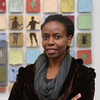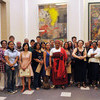PhD examines complex governance systems in Kosi Bay
26 May 2016 | Story Helen Swingler. PhotoJe'nine May.
It was the timely intervention of a far-sighted early mentor, Professor Dianne Scott, in Philile Mbatha's honours year at the University of KwaZulu-Natal that changed the course of her life.
One of UCT's five New Generation of Academics Programme (nGAP) scholars, Mbatha had been set for a career at the parastatal who'd funded her honours year. And it was time to honour the family of modest means who'd supported her through her difficult undergrad years as she struggled to find her path.
But her canny mentor told her to think big. Scott had seen Mbatha's potential in academia as a lecturer – not to mention a transformer and bridge builder − and gently nudged her towards harbour.
Academia resonated with the young graduate and when she won a scholarship to do a master's in environmental and geographical science at UCT, Mbatha seemed well on her way. But it was a difficult move from subtropical, integrated KZN. She hated Cape Town and felt alienated on a campus that seemed too white. Her friends reminded her of the obstacles for a young black woman hoping to make a career in academia.
Fast forward five years to a lecture room where Mbatha is teaching human geography and environmental sustainability to first-year students (while completing her thesis). Thanks to the nGAP programme, Mbatha is now a full-time academic in the Department of Environmental and Geographical Sciences and is within sight of her PhD.
The nGAP is a joint Department of Higher Education and Training / university initiative to raise up talented young black academics like Mbatha by establishing them at universities as permanent staff. The initiative allows these scholars to immerse themselves in research and some light teaching (not more than 20% of their time) for six years until they're fully rooted as an academic.
Complex legalities
It's a long way from where she started as an undergrad from Umlazi, but Mbatha's PhD research will bring her full circle in a sense, because her research will benefit the rural communities in the Kosi Bay region of her home province.
Kosi Bay lies on the fringe of the iSimangaliso Wetland Park, South Africa's first natural World Heritage Site. Stretching from Maphelane in the south, the park is a natural paradise with three major lake systems and eight interlinking ecosystems. It's home to most of South Africa's remaining swamp forests, Africa's largest estuarine system and ancient vegetated coastal dunes.
Mbatha's doctoral research examines the complex, multi-layered conservation laws governing the park and how these influence the livelihoods of those living in the Kosi Bay area. As a World Heritage Site, the park is governed by international laws through the United Nations Educational, Scientific and Cultural Organisation (UNESCO), all the way down to local laws that apply to South Africa's Marine Protected Areas.
The complex legalities protecting the region have all but separated the local people from the environment, says Mbatha. They have lost their arable lands to conservation and in order to make a living they illegally cultivate land across the border in Mozambique. With limited options, others have turned to fishing and use customary rules to manage the fisheries themselves after kicking out conservation authorities in the early millennium.
Mbatha understands the conflict well.
“The livelihoods of the rural people are usually not well understood by policymakers and government. The local people see themselves as one with the environment; they don't understand why the law separates them to protect the environment. My PhD documents that and brings their [the community's] voices to the fore.”
As a local, Mbatha is well placed as a researcher because she is able to harness her insights into the region's challenges and problems. It gives her a leg-up in a community that is wary of researchers and their intentions. She's been able to integrate herself into the community, which has allowed her to better understand their concerns and to explain sometimes complex pieces of legislation. She knows the customary requirements of working through chiefs, but also understands the need to engage the community directly.
Local knowledge
The Kosi Bay case study will add an important local precedent in a curriculum that is often heavy with European and North American examples and, as such, it will enrich UCT's teaching and research.
“I thought deeply about my PhD topic,” Mbatha adds. “In the beginning, my mentor and co-supervisor, Associate Professor Merle Sowman, asked me: 'What is your contribution to new knowledge?' ”
Her PhD answers that question.
Opportunities to travel – the first of which was a Fox International Fellowship to Yale in the first year of her doctoral studies – have also helped her along. It was an invaluable experience, says Mbatha.
“It really helped shape my thinking about how policies work from the international level and I was able to bring that back.”
This year she has an opportunity to travel to Northumbria University, Newcastle, and the University of Exeter, Exeter, from September to November as a Newton Fund* researcher and guest lecturer. She will also write a paper on human wellbeing in fishing communities around the globe.
“They wanted someone to bring an African perspective to their courses.”
Her former mentor, Scott, would be very happy. Not only has her protégé taken her place in the lecture theatre, but she is also teaching a course using material she's designed herself, based on the research she developed in the context of her community.
“When I applied to UCT, I studied the department's curriculum and realised there was a huge gap in knowledge from rural contexts, which is not that well taught. I felt it was something I could bring to the table.”
*The Newton Fund initiative, funded by the British Council, strengthens research and innovation partnerships between the UK and emerging knowledge economies like South Africa's.
 This work is licensed under a Creative Commons Attribution-NoDerivatives 4.0 International License.
This work is licensed under a Creative Commons Attribution-NoDerivatives 4.0 International License.
Please view the republishing articles page for more information.
Centre for Higher Education Development
In the news


.jpg)

































































































































































































































